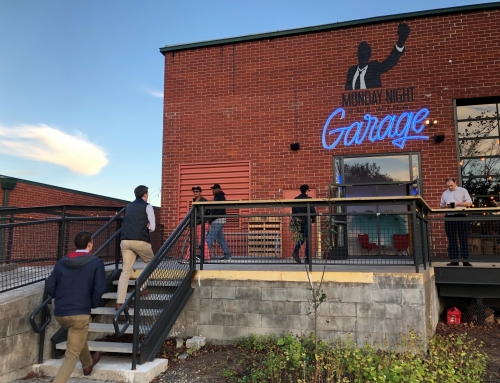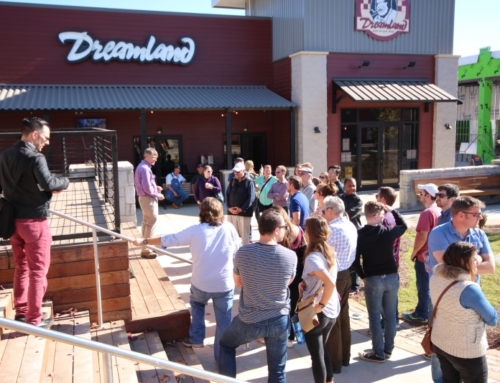$300M-$500M Project Announced for Hapeville
The Atlanta Business Chronicle reports that developer Neal Golden and a team of investors have assembled more than 35 acres of single-family homes in Hapeville, near Hartsfield-Jackson Atlanta International Airport. Tunnell-Spangler-Walsh & Associates (TSW) was the planning consultant for the City of Hapeville Main Street Town Center LCI Plan.
$300M-$500M project could spark Hapeville
Bryan Long Staff Writer
Atlanta Business Chronicle
Published January 23, 2006
An Atlanta developer is using a tactic that helped build Atlanta’s northside to try to spark development on the southside.
Developer Neal Golden and a team of investors have assembled more than 35 acres of single-family homes in Hapeville, near Hartsfield-Jackson Atlanta International Airport.
They plan to raze the houses and create a $300 million to $500 million mixed-use project.
House by house, Main Street Partner Group LLC acquired 116 lots in Hapeville over the past 12 months. The company already has spent about $11 million, an average of less than $95,000 per lot. Some of those lots included small shops and offices.
Demolition started this month on about eight blocks sandwiched between the northern edge of the airport and Hapeville’s retail district along Central Ave.
Detailed plans, including density for the neighborhood, are expected to be announced by Hapeville Mayor Alan Hallman the week of Jan. 23.
Golden, a principal with Main Street Partner Group and senior executive vice president of U.S. operations for Newmark Knight Frank, is leading the development team.
New York-based Newmark Knight Frank is expanding its role into development with a small group of related companies such as Main Street. NKF-related companies are planning commercial office buildings in Florida and scouting other Atlanta locations, including Midtown.
Funding for projects comes from a mix of New York equity partners and local investors.
In December, Main Street demolished a nearby apartment complex on Virginia Avenue to build a 30,000-square-foot mixed-use project that sits outside the planned entrance to the larger mixed-use project.
The 35-acre project will include a variety of townhomes and condominiums. Some of the homes will be lofts above retail. The intention is to create an urban neighborhood from scratch that includes the amenities of suburban subdivisions, but without the cul-de-sacs.
“We want people to walk to the corner store, to the coffee shop, to restaurants,” Golden said.
Hallman said he’s watched the process closely because, at only two square miles, Hapeville has limited space. He wants to be sure the project blends with existing neighborhoods and doesn’t consume the city.
Keeping control over the density, he said, has been a primary goal.
Hallman, who’s been on the city council for nine years including his time as mayor, said he’s glad to see a developer finally follow through with a project.
“We have seen several other proposals such as this come and go,” he said. “And this is one of the first ones where the players at the table have the financial wherewithal to make it happen.”
Golden, for one, believes he won’t be the last developer to find Hapeville.
“The whole south end of Fulton County is getting ready to explode,” he said.
Although the reasons why Atlanta’s southside hasn’t seen the same growth as Sandy Springs and Roswell are many and complex, Golden said one key factor has been anticipating the growth of the airport.
For decades, developers didn’t know which way Hartsfield-Jackson would expand — only that it eventually would grow larger. Hapeville lost about half the town’s population when the airport expanded during the 1970s.
“Now that the fifth runway is going on the other side, the developers are ready to explode,” he said.
Another growth trigger could come Jan. 23, when Ford is expected to announce whether it will close its Atlanta Assembly Plant in Hapeville.
If the plant closes, as automotive analysts predict, more than 128 acres fronting Interstate 75 would be available for redevelopment in Hapeville’s city limit.
Market sources believe the site could be used for a number of products but would most likely attract the most money from large-scale retailers. A mixed-use project similar to Atlantic Station could bring more lofts, condos and townhomes. And with direct access to the airport, commercial office developers might find the site attractive, too.
If Ford pulls out, Hapeville would lose 2,100 jobs within a few years. But Hallman doesn’t believe that would be the end of the city. It would simply be a new beginning, he said, especially following Main Street’s project.
“This project raises the bar for Hapeville,” Hallman said. “It polishes the diamond, and things only get better from here.”





